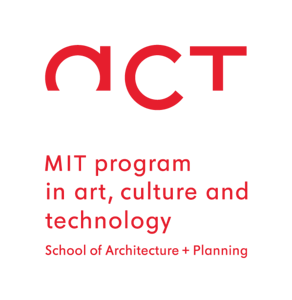November 13–December 10, 2018
E15-001 Wiesner Building
20 Ames Street
Cambridge, MA 02142
United States
The MIT Program in Art, Culture and Technology (ACT)’s Lecture Series draws together artists, scholars, and other cultural practitioners from different disciplines to discuss artistic methodologies and forms of inquiry at the intersection of art, architecture, science, and technology. Each spring and fall semester brings a different thematic focus and the format for each event shifts depending on the visitor(s) and the nature of their presentations and performances.
November 13: Richard Sennett—”The Good Craftsman”
Richard Sennett will be giving a lecture based on his book The Craftsman. Sennett notes that “good craftsmanship” stands for work of good quality. What sort of work is this in the digital era? The lecture explores this question in three domains: the acquisition of craft skills, learning from others in workshops, and technical supports and barriers to doing good work.
Respondent: Tobias Putrih, Lecturer in Art, Culture and Technology, Department of Architecture, MIT
December 3: Joan Jonas and Sung Hwan Kim In Conversation
ACT’s Professor Emerita, Joan Jonas, and alumnus, Sung Hwan Kim, will be together in conversation with ACT Director, Judith Barry. This event will honor Jonas’ being awarded the Kyoto Prize, her contributions to ACT, and highlight the re-emergence of performance art at ACT, to be taught by Kim in Spring 2019.
Respondents: Jay Scheib, Professor in Theater, Department of Music And Theater Arts, MIT, and Karthik Pandian, Assistant Professor of Visual and Environmental Studies, Department of Visual and Environmental Studies, Harvard
December 10: David Joselit—”Untranslatable: Conceptual Art since the 90s”
It is often assumed that Conceptual Art pivots on bureaucratic means of communication such as text and documentary photography, and that it performs a dematerialization of traditional media such as painting and sculpture. In this lecture, David Joselit will argue that since the ’90s, artists have focused more on Conceptual Art’s legacy of remediation, rather than its capacity to de-materialize, making it possible to develop Conceptual practices pivoting on such media as painting (as in the work of R.H. Quaytman), sculpture (exemplified by Rachel Harrison), and performance (in the oeuvre of Andrea Fraser).
Respondent: Caroline A. Jones, Professor in History, Theory and Criticism, Department of Architecture, MIT
ACT’s Fall 2018 Lecture Series is conceived by Judith Barry, ACT Director, and coordinated with Marissa Friedman, Communications and Public Programs Associate, and Laura Knott, Consulting Curator.
Questions?
Conact Marissa Friedman (marissaf [at] mit.edu), ACT’s Communications and Public Programs Associate.
This series is made possible with the generous support of The Council for the Arts at MIT (CAMIT).



